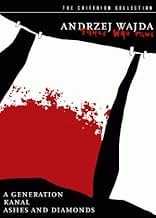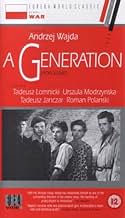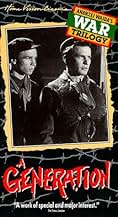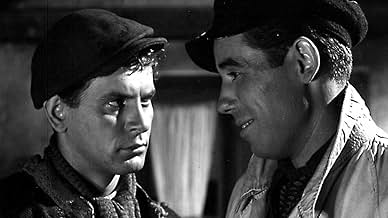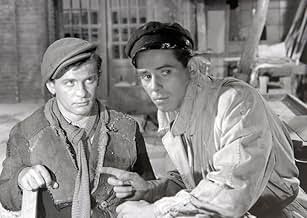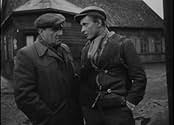Ajouter une intrigue dans votre langueStory of youth during the German occupation of Poland in World War II who come to adulthood through love and adversity.Story of youth during the German occupation of Poland in World War II who come to adulthood through love and adversity.Story of youth during the German occupation of Poland in World War II who come to adulthood through love and adversity.
- Réalisation
- Scénario
- Casting principal
Avis à la une
The film concerns a young man during the Nazi occupation of Poland. In the beginning, he's a bit of a jerk but eventually gets a job and shows great responsibility. Later, he is welcomed into the partisans and it is an interesting look into this seldom talked about period of history.
The film gets a score of 8. It would have had a higher score had the film been more honest--as it portrays the Communists as being THE resistance and those partisans wanting a return to the democratic system as being greedy bourgeoisie. However, on the Criterion DVD, Wajda talks about how this was one of the required changes the Soviet-dominated Polish government mandated before they'd allow his film to be shown. So, considering the sensibilities of the time, it's not surprising that a little misrepresentation occurs. Still, it's a near-great film and a wonderful addition to KANAL. Wajda's 3rd film, ASHES AND DIAMONDS, unfortunately is a big disappointment to me and is considered the third in this trilogy about life in Poland during WWII.
There is one MINOR mistake in the film. At one point, the hero is hit in the head and is bleeding. Later in the same scene, there is no head wound!
-
What is so striking to me about this film is the irony of history: I believe that not only we (living in the 21st century) are able to understand this now, but that viewers of this film in 1955 Poland would have recognized as well. By 1955 Poland was stuck behind the Iron Curtain, held hostage by communist rule. Not unlike the Czechs (and their great communist satires), all art and media was mediated by the communist government. To see these young Poles attempt to improve their country by overthrowing the Nazi party with communism is ironic and ultimately tragic.
Although this film may appear to some as communist propaganda, I see this film as a tongue-in-cheek allegory about the meaninglessness of war, and the complication of those attempting to end the war with another flawed ideology. Not a great film, but certainly interesting, especially when considering the historical context in which it was made.
As for what I thought of Andrzej Wajda's feature debut. I earlier saw Wajda's "Popiół i diament" ("Ashes and Diamonds" in English). From what I understand about the themes that Wajda depicted in that one, it sounded like what we might call the perfect Polish movie. "A Generation" is also really good, although I did find "Ashes and Diamonds" to be a little better. In an interview, Wajda noted that the title refers to his generation: the leaders of Poland's pre-war film industry had fled the country, and so his generation was essentially starting it from scratch.
All in all, a very good movie. Watch for a young Roman Polanski as one of Stach's compatriots.
Le saviez-vous
- AnecdotesFirst feature film directed by Andrzej Wajda.
- Citations
[first lines]
Stach Mazur: I was born here in the slums, on the outskirts of Warsaw. I grew up in poverty. Here I made my first friends and had my first lessons. I often had it rough as a kid, because I couldn't tell my friends from my enemies. I was too trusting and relied on my swift legs and strong fists. My Ma kept me on a short leash and tried to push me off to work. But I took it as typical woman's nagging, preferring to play knives with my buddies instead.
- ConnexionsFeatured in Zbyszek (1969)
- Bandes originalesStändchen
Composed by Franz Schubert
Meilleurs choix
- How long is A Generation?Alimenté par Alexa
Détails
Box-office
- Montant brut mondial
- 24 114 $US
- Durée
- 1h 27min(87 min)
- Couleur
- Mixage
- Rapport de forme
- 1.37 : 1


